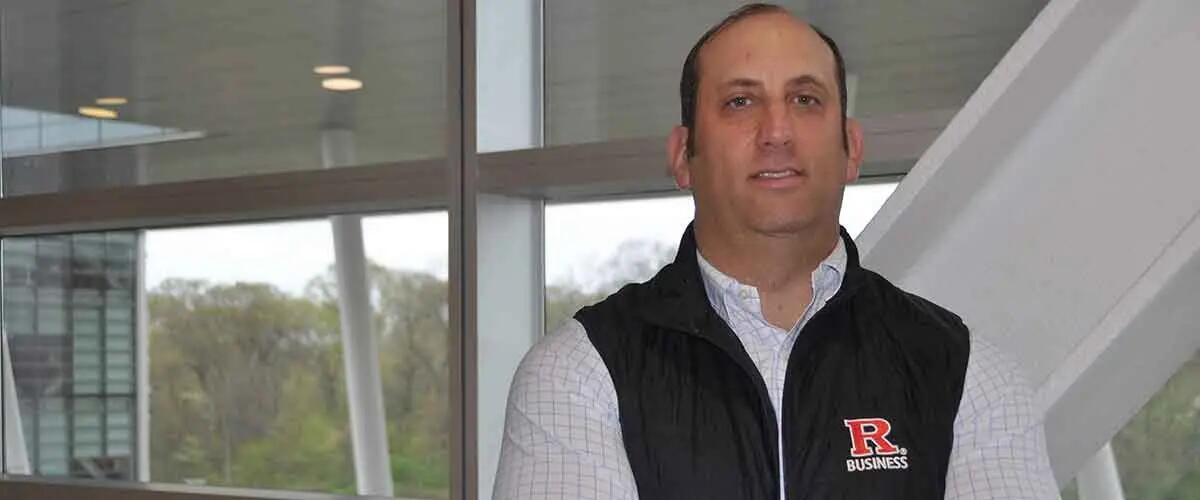
Ben Axler at Rutgers Business School-New Brunswick
Alumnus offers students a different perspective on investing
Ben Axler, the founder and chief investment officer of Spruce Point Capital Management, stood at the front of Room 5133, rolling up his shirt sleeves while students streamed into Professor Fred Hoffman’s late afternoon Credit Analysis class at Rutgers Business School-New Brunswick.
Axler wasn’t there to teach, but he did have some valuable lessons to share. As a guest speaker, he knew his role was to spice up the course itinerary with some real-world experiences about analyzing stocks and short selling.
After eight years as an investment banker, first with Credit Suisse and then Barclays Capital, Axler left Wall Street. The collapse of Lehman Brothers was still reverberating through the financial industry. Axler decided to reinvent himself. He started Spruce Point Capital Management in 2009 with a private pool of money and a focus on short selling and forensic accounting.
Hoffman introduced Axler, a business school alumnus, summarizing his skillset and strategy. “Focus on the forensics he does,” Hoffman told them.
Axler said he views himself as a reverse financial engineer “looking for embellishments.” He also described himself as an activist short seller who is not reluctant to counter the wave of “buy” ratings among other analysts.
In Hoffman’s class, he shared a story about Oatly, the Swedish non-dairy beverage maker that took the market by storm several years ago. The company was endorsed by a host of celebrities – an immediate red flag in Axler’s view.
But there were more significant issues outlined in a 124-page report Spruce Point Capital Management released in 2021, just two months after Oatly’s $10 billion initial public offering. The report raised questions about Oatly’s financial reporting, the validity of its claims of sustainability and its slipping market share in Sweden. The firm warned investors of an intermediate downside risk of between 30-70 percent.
Oatly’s stock tumbled in reaction. Company officials rejected Axler’s claims, which made headlines on business news channels like Squawk Box. The stock, which began trading at over $20 a share, sells for just over $1 a share today.
Axler mentioned other companies that his firm has dived into deeply to uncover potential risks to investors: The retailer Boot Barn and the Israeli-based counter maker, Caesarstone. (Axler enlisted Rutgers Material Science experts to test the company’s quartz claims.)
There were questions from Hoffman’s students about Axler’s business model, the soundness of his short-selling strategy, and how he carries out his research.
Axler explained that his name is on all the research he does and he’s accountable for the accuracy of his opinions. “We try to go deep to get an understanding of things that we think the rest of the market doesn’t know about,” he said.
Spruce Point Capital manages $335 million in funds, according to federal regulatory documents. While the firm has been the subject of a Harvard Business School case study and featured by Institutional Investor, Axler described its success as “sleepy” and “off the radar.”
Axler graduated from Rutgers in 1999 with majors in marketing and statistics. After earning a master’s degree in statistics from Yale, he was recruited by Credit Suisse. In banking, he structured and executed financing deals and worked in derivative risk management for Fortune 500 clients.
Axler said his decision to build a firm based on forensics and short selling was an effect of what he experienced early in his career. He also knows from his days as an investment banker that Wall Street may tout events as opportunities for investors when, in fact, the success is difficult to predict. Maybe even more influential were the huge accounting scandals – Enron, WorldCom, Tyco, among them, that destroyed shareholder value.
“What I’m trying to do is hold companies accountable,” he told Hoffman’s students.
After the class, one of those students, Asger Hysi, described Axler’s talk on short selling as “incredibly insightful.”
“It further developed the skill set of being able to thoughtfully ‘lean against the wind’ and formulate your own opinion on what drives or destroys value in a business,” she said.
Hugo Tan, another student who is active with the Rutgers Student Managed Fund, said It was interesting to hear the rationale from an often-misunderstood group of investors who seek to shine a light on often unsavory firms with their reports.
“Some of (Axler’s) methodology has sparked new insights that I'll consider when pursuing my equity research reports, allowing for deeper thought rather than just going with the consensus,” he said.
When Axler was in college at Rutgers, he was an honor student and a fraternity brother at Phi Delta Theta. One of the things that had a lasting impact on him was a merit scholarship he received. (The scholarship was funded by businessman and Rutgers University alumnus George Triblehorn.) “It was validation that I was working hard,” Axler said. “It felt good that even at a big university, I could stand out.”
His gratitude isn’t just nostalgic. In the last 11 years, he has created two scholarships to support high-achieving students who have a business or economics focus and an affinity for quantitative subjects such as business analytics or statistics.
He was 34 years old when he created the first gift, the Ben E. Axler Scholarship, which helped seven undergraduates selected on the basis of academic merit and financial need. He and his wife pledged $100,000 to create a second endowed scholarship that bears the name of his company.
Axler also recognizes that he can enhance classroom teaching by appearing as a guest speaker with a lecture that reflects the real world of investing. After Hoffman’s class, he reflected on why it was important.
“Schools don’t teach what I just talked about,” he said. “They don’t teach these methods.”
-Susan Todd
Press: For all media inquiries see our Media Kit


